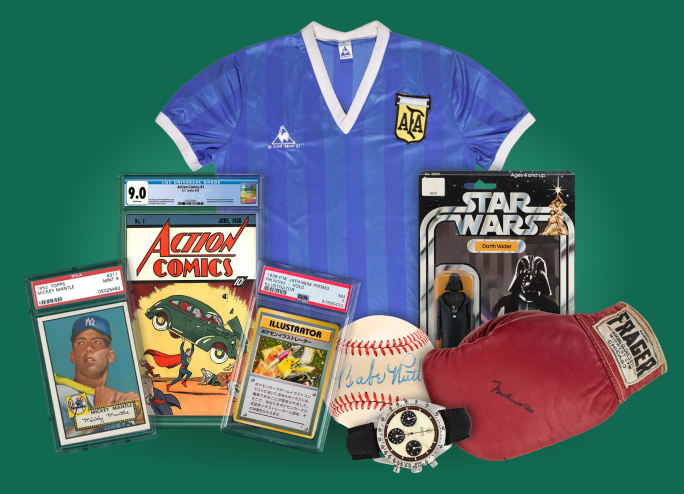Educational
What's The Difference Between PSA, Beckett, SGC, CGC, and Other Grading Services?
Published Dec 5 2023

Source: PSA
Grading companies have long been a major part of card collecting, and as more and more collectors prize the look, protection and authentication that comes with a graded and slabbed card, new grading companies continue to enter the space. But deciding which company to send your cards to can be complicated, so we've pulled together a short guide to the major players in the space. While there are differences between each company, which one you choose should ultimately come down to personal preference and your reasons for getting the item graded.
The Big Four Grading Companies: Beckett, CGC, PSA and SGC
What distinguishes one card grading company from another? We'll list these in alphabetical order.
 Source: Goldin Auctions
Source: Goldin Auctions
BGS (Beckett Grading Services)
Outside of Bowman, Donruss, Fleer and Topps, Beckett might be the most recognized name in the sports card industry. In the ‘80s, Dr. James Beckett's team published Beckett Baseball (followed by other sports later), which became the go-to price guide for collectors. Beckett joined the grading card industry in 1999, and their addition of subgrades (centering, corners, edges and surface), on their labels made them a differentiator from PSA. Interestingly, since a BGS 10 is considered a better card than most cards graded with a PSA 10, card collectors view a BGS 9.5 closer to PSA 10 values. Beckett has also long been a favored choice for baseball prospect collectors (Bowman Draft, etc.) over the past decade.
CGC (Certified Guaranty Company)
Under the Certified Collectibles Group (CCG) umbrella of grading companies, CGC jumped into the mix in 2021 and quickly became a major player in the industry. Formerly known as CSG, in just three years, CGC has eclipsed the 5 million graded cards mark. While they are considered a young card grading company, their parent group has been grading other collectibles, like coins, comics, stamps and currency for the past 30 years. In the past two years, they have changed their labels twice, much to the happiness of collectors, and they're carving out a huge niche in the TCG collectors' world. In October of 2023, CSG graded 272,000 cards, which was second to only PSA, but just 6.25% of them were sports cards. They graded an astounding 255,000 TCG cards!
 Source: CGC
Source: CGC
PSA (Professional Sports Authenticators)
The grandfather of all card grading services, PSA is considered the gold standard of slabs, in part because it's a trusted name that has been in the game dating all the way back to 1991. Grading through PSA became so popular during the card collecting boom earlier this decade, PSA had to temporarily stop taking submissions in order to catch up. Today PSA's popularity still can mean longer waiting periods to get standard cards graded, but wait times continue to get better. Their services are also generally the most expensive of the Big 4. Despite the higher costs and longer wait times, PSA is still the leader in the industry, grading more than twice the number of cards than all the other grading companies combined.
SGC (Sportscard Guaranty Corporation)
Considered the greatest disruptor to the card-grading industry, SGC has now climbed into second place behind PSA among sports card collectors wishing to get their cards graded and slabbed. The “tuxedo” look of their silver labels and black slabs are distinctive, and their grading consistency has become a hallmark in the industry. But it's their super-fast turnaround times and cheap pricing that lead many collectors to use SGC over the competition. With PSA not taking new submissions in 2021, SGC was able to carve out a huge chunk of the market for themselves, and they're still going strong.
BONUS: The Newcomers
Innovation continues to pour into the grading industry, with many new entrants popping up over the past few years. And with the improvement of artificial intelligence, many are starting to experiment with AI grading. Arena Club, HGA and TAG are worth exploring as you evaluate where to send a card for grading, as each offers features and benefits not yet available from the Old Guard.
Arena Club
Arena Club uses a mix of human grading and AI technology when reviewing cards, with a standard 1-10 grading scale returned after grading. Each card receives a grade for Corners, Surface, Edges and Centering, which are then used to create the aggregate grade. Arena Club slabs are sleek and compact, using an ultrasonic welding machine to seal each card. Because Arena Club also has a vaulting option and marketplace, users of their service can have cards held in a vault or immediately listed on their site for sale.
HGA (Hybrid Grading Approach)
From colored labels to custom labels to horizontal slabs for landscape cards, HGA offers great alternatives from the Big Four grading companies. The labels are a huge draw, as collectors can get labels color-matched to either the design of the card or the player's team colors. Many collectors looking to spice up their personal collection work with HGA because their slabs are so unique, especially through their custom label design program.
TAG
TAG is a technology-led grading company that uses a 1,000 point scale when evaluating each submission. They utilize "Photometric Stereoscopic Imaging" for each grade, and by scanning a code on the slab, users can check out a complete scoring breakdown of their card. TAG also provides Pop report data, and a leaderboard to show how your card stacks up against the rest TAG has evaluated. TAG also makes submitting cards easy, providing Submission Kits with all of the items necessary for safely sending a card in to be graded.
 Souce: HGA
Souce: HGA
